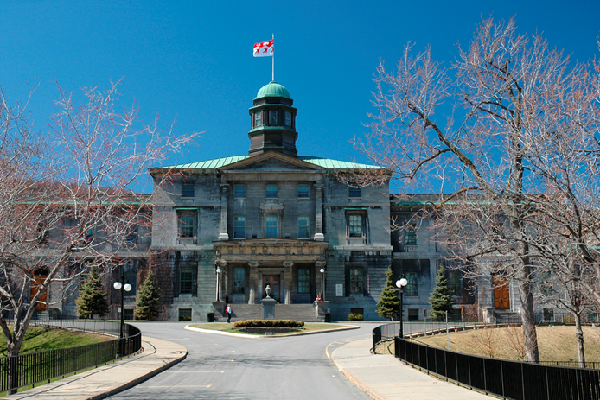Regarding quality higher education, there are many good reasons why Canada is a great place to study abroad. The costs of studying and living there are lower than in other popular countries. The Canadian government supports international students coming to the country and even gives grants to international students. Full-time students can choose to stay and work in Canada for up to three years. Canada is predominantly an English-speaking country. Canada is a country that is open, safe, and full of different cultures.
College and university tuition costs are generally cheaper than in Australia, the United Kingdom, and the United States. In this article, we discuss how to get admission into one of the top universities in Canada, McGill University.
- Overview of McGill University
- Benefits of studying at McGill University
- Getting admission into McGill University
- Cost of Studying at McGill University
- Scholarships and financial aids
- FAQs
- Where is McGill University located?
- Is McGill University a public or private institution?
- What are some notable programs or faculties at McGill University?
- What is the acceptance rate at McGill University?
- Does McGill University offer scholarships or financial aid?
- Is there a separate application process for international students?
- What is the job placement rate for graduates of McGill University?
Overview of McGill University
McGill University is a public research university in the Canadian city of Montreal, in the province of Quebec. It is the oldest university in Montreal and one of only three universities in Quebec where English is the primary language of instruction. A royal charter established the university in 1821. It was named after James McGill, a Scottish businessman whose will set up the University of McGill College in 1813.
McGill’s work in the fields of science, health, and biology is known all over the world. It is known worldwide for the high quality of its study and training programs. Nearly 30% of McGill’s students come from more than 150 different countries. This is the most significant number of international students at any Canadian research university.
Benefits of studying at McGill University
Studying at McGill as an international student has many benefits that can enrich your academic and personal experience. Some of these benefits are:
- You will receive a high-quality education from one of the world’s leading universities, with access to renowned faculty, cutting-edge research facilities, and a wide range of academic programs.
- You will be part of a diverse and vibrant community of students from over 150 countries who bring different perspectives, cultures, and backgrounds to the campus.
- You will live in Montreal, one of the best student cities in the world, where you can enjoy a bilingual environment, a rich cultural scene, a low cost of living, and a friendly atmosphere.
- You will have opportunities to develop your skills and expand your professional network through internships, co-op programs, research opportunities, and career services.
- You will join a network of over 300,000 alumni based in more than 180 countries who can provide you with support and guidance throughout your career.

Getting admission into McGill University
Eligibility requirements
The admission requirements vary based on the desired program and the applicant’s educational background. On the McGill website, you can view the specific requirements for the program of your choice. In general, you will require the following:
- A high school diploma or bachelor’s degree (depending on the level of study) with a minimum GPA of 3.0 and above.
- English proficiency test scores such as TOEFL or IELTS, unless English is an official language in your country.
- Supporting documents such as transcripts, letters of recommendation, CV/resume, personal statement, etc.
Application Process
Starting October 1, you may apply online via the McGill website. The application deadline depends on the program and term you wish to start. You can find the deadlines on the McGill website. The application fee for most undergraduate programs is Can$122.52, while the fee for most graduate programs is Can$117.35. Following your application, you may monitor the progress of your application and submit any extra papers using Minerva, McGill’s online student portal.
Admission Competitiveness
McGill is a highly selective university that receives thousands of applications every year. The admission cut-offs can change yearly depending on the number and quality of applicants. You can review the previous years’ cut-off scores to get an idea of the program’s competitiveness you are interested in on the McGill website. However, grades are not the only factor that determines your admission. McGill also considers your overall academic record, statement, extracurricular activities, references, and any other information you provide in your application.
Cost of Studying at McGill University
The cost of studying at McGill depends on several factors, such as your program, level of study, residency status, living expenses, and budget. You can use the cost calculator on the McGill website to estimate your tuition and fees based on your program and term. On the McGill website, international students can access information regarding scholarships, bursaries, loans, and other financial aid options. Additionally, you will need to consider the costs of applying for a study permit and a visa from the Canadian government, as well as health insurance, transportation, accommodation, food, and other expenses.
Scholarships and financial aids
International students who desire to study at McGill University in Canada have various funding options. Here are a few examples:
- Pierre Elliott Trudeau Foundation Scholarships: These are one of just a handful of McGill University scholarships available to overseas postgraduate students. Scholarship value: The yearly scholarship value for each scholar is roughly CAD 60,000. A CAD 20,000 yearly travel allowance is also provided. This is valid for up to three years1.
- McGill’s Mastercard Foundation Scholars Program: This program gives full scholarships and extensive assistance to academically gifted but economically disadvantaged young people from Sub-Saharan Africa who aspire to pursue undergraduate or graduate studies at McGill1.
- McGill Financial Aid: Scholarships and Student Aid offer need-based Financial Aid Programs for incoming and existing undergraduate students from Canada, the United States, and worldwide. These programs provide loans and bursaries to students who want additional financial support or suffer financial hardship.
- McCall MacBain Scholarship: This is a complete scholarship at McGill for your master’s or professional study. Applications will be accepted beginning June 1, 2023. Students and graduates of Canadian and American colleges and Canadians from other countries must apply by September 27.
FAQs
Where is McGill University located?
McGill University is situated in Montreal, Quebec, Canada.
Is McGill University a public or private institution?
McGill University is a public research university.
What are some notable programs or faculties at McGill University?
McGill is renowned for its Medicine, Law, Engineering, Management, and Arts programs. It is consistently ranked among the top universities in Canada and the world.
What is the acceptance rate at McGill University?
Program and level affect acceptance rate. It’s competitive, with a 40–50% admission rate.
Does McGill University offer scholarships or financial aid?
Yes, McGill provides various scholarships, bursaries, and financial aid options to help students with their educational expenses. These awards are based on academic merit, financial need, or both.
Is there a separate application process for international students?
International students must provide additional paperwork and complete the International Application for Admission. It’s vital to follow the university’s application standards.
What is the job placement rate for graduates of McGill University?
McGill University has a strong alum network and a good reputation in the job market. The university provides career services and resources to help students with job placement, and many graduates find successful employment or pursue further education after graduating from McGill.














